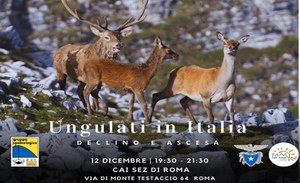Ungulates in Italy. Decline and rise
The fifth and final meeting organized by the CAI speleological group with the TAM (Mountain Environment Protection) commission of the CAI of Rome will be held on 12 December.
After a period of decline that culminated in the second half of the last century, the species of cervids and bovids present in Italy (deer, roe deer, fallow deer, mouflon, chamois and ibex) have begun a phase of recovery throughout Italy, due both to the improvement of environment (abandonment of mountain areas, increase in forests), and the creation of protected areas and intervention to reintroduce populations. Today we have many more wild ungulates than just 20 years ago, with positive effects on the environment and on other species, such as large predators. However, there are also problematic aspects, such as the negative impact on some priority species or environments, the damage caused to agriculture and road accidents. The management of these species therefore requires an overall approach, which also takes into account the social component as well as the conservation one.
- https://www.isprambiente.gov.it/en/news/ungulates-in-italy-decline-and-rise
- Ungulates in Italy. Decline and rise
- 2024-12-12T19:30:00+01:00
- 2024-12-12T21:30:00+01:00
- The fifth and final meeting organized by the CAI speleological group with the TAM (Mountain Environment Protection) commission of the CAI of Rome will be held on 12 December. After a period of decline that culminated in the second half of the last century, the species of cervids and bovids present in Italy (deer, roe deer, fallow deer, mouflon, chamois and ibex) have begun a phase of recovery throughout Italy, due both to the improvement of environment (abandonment of mountain areas, increase in forests), and the creation of protected areas and intervention to reintroduce populations. Today we have many more wild ungulates than just 20 years ago, with positive effects on the environment and on other species, such as large predators. However, there are also problematic aspects, such as the negative impact on some priority species or environments, the damage caused to agriculture and road accidents. The management of these species therefore requires an overall approach, which also takes into account the social component as well as the conservation one.
- When Dec 12, 2024 from 07:30 PM to 09:30 PM (Europe/Berlin / UTC100)
- Where Rome, Sez. CAI, via di Monte Testaccio, 64
-
Add event to calendar
iCal
ISPRA researcher Francesco Riga is participating in the meeting.
ISPRA has also recently started a collaborative relationship with the CAI aimed at collecting environmental information along the Sentiero Italia Cai.

